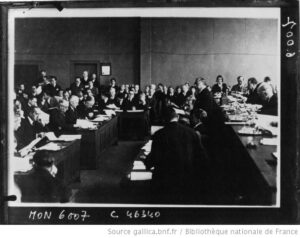(This is section 34 of the World Beyond War white paper A Global Security System: An Alternative to War. Continue to preceding | following section.)

International institutions for managing conflict without violence have been evolving for a long time. A body of very functional international law has been developing for centuries and needs to be further developed to be an effective part of a peace system. In 1899 the International Court of Justice (ICJ; the “World Court”) was set up to adjudicate disputes between nation states. The League of Nations followed in 1920. An association of 58 sovereign States, the League was based on the principle of collective security, that is, if a State committed aggression, the other states would either enact economic sanctions against that State or, as a last resort approach, provide military forces to defeat it. The League did settle some minor disputes and initiated global level peace building efforts. The problem was that the member states failed, in the main, to do what they said they would do, and so the aggressions of Japan, Italy, and Germany were not prevented, leading to World War II, the most destructive war in history. It is also noteworthy that the U.S. refused to join. After the Allied victory, the United Nations was set up as a new attempt at collective security. Also an association of sovereign states, the UN was supposed to resolve disputes and, where that was not feasible, the Security Council could decide to enact sanctions or provide a counter military force to deal with an aggressor state.
The UN also greatly expanded the peacebuilding initiatives begun by the League. However, the UN was hobbled by built-in structural constraints and the Cold War between the U.S. and the U.S.S.R. made meaningful cooperation difficult. The two super powers also set up traditional military alliance systems aimed at one another, NATO and the Warsaw Pact. Other regional alliance systems were also established, such as the Southeast Asia Treaty Organization (SEATO). While international institutions for managing inter-state conflicts are a vital part of a peace system, the problems with both the League and the UN arose in part from a failure to dismantle the War System. They were set up within it and by themselves were unable to control war or arms races, etc. Some analysts believe that the problem is that they are associations of sovereign states which are committed, in the last resort (and sometimes earlier) to war as the arbiter of disputes. There are many ways that the UN as well as other international institutions can be constructively reformed to become more effective in keeping the peace including reforms of the Security Council, the General Assembly, peacekeeping forces and actions, funding, its relationship to non-government organizations and the addition of new functions.
(Continue to preceding | following section.)
We want to hear from you! (Please share comments below)
How has this led you to think differently about alternatives to war?
What would you add, or change, or question about this?
What can you do to help more people understand about these alternatives to war?
How can you take action to make this alternative to war a reality?
Please share this material widely!
Related posts
See other posts related to “Managing International and Civil Conflicts”
See full table of contents for A Global Security System: An Alternative to War









One Response
The U.N. is the embryo of the New World Order. It was created by the bankers who bank-rolled both sides of World War II in order to drive the world into a one world government. “Peace through total control” would be an accurate description of their goal. Freedom is risky, but tyranny is worse.